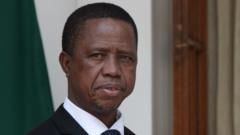Abdullah Ahmad Badawi, Malaysia’s fifth prime minister, has died at the age of 85. Known for his calm and moderate political approach, he fostered greater freedoms in a nation navigating the complexities of its religious and cultural diversity.
Abdullah Ahmad Badawi, Former Prime Minister of Malaysia, Passes Away at 85

Abdullah Ahmad Badawi, Former Prime Minister of Malaysia, Passes Away at 85
Remembering the understated leadership of Abdullah Ahmad Badawi, who served Malaysia during a transformative period from 2003 to 2009.
Abdullah Ahmad Badawi, the fifth prime minister of Malaysia, has passed away at the age of 85, confirmed by his son-in-law, Khairy Jamaluddin. Badawi, who also had been dealing with various health issues, including dementia, died in Kuala Lumpur, where he had spent much of his later life. His leadership era, spanning from 2003 to 2009, was characterized by a notable shift from the previous strongman rule of Mahathir Mohamad, marked by a more restrained and dialogue-focused governance style.
During his tenure, Abdullah played a crucial role in promoting political freedoms and moderating the role of Islam within Malaysian politics, working towards a harmonious coexistence among the country's diverse populations of Muslims, Chinese, and Indians. His approach was often described as calm and soothing, leading experts to note that he encouraged open dialogue and discussions about pressing national issues.
However, Abdullah’s less forceful leadership style often drew criticism in contrast to the dynamic approach of his predecessor. Some detractors mockingly nicknamed him “the sleeping prime minister” due to instances where he would appear to nod off during meetings, largely attributed to his struggles with sleep apnea. Despite these critiques, his administration initially enjoyed significant support, highlighted by a strong electoral victory that set high expectations for his governance.
Although his legacy is mixed, many, including political analysts, recognized the importance of his efforts to open up political discourse in Malaysia—a country historically grappling with the complexities of its cultural landscape and political ideologies. Abdullah's passing brings to an end the chapter of a leader who sought to promote a more inclusive progressive vision for Malaysia’s future.
During his tenure, Abdullah played a crucial role in promoting political freedoms and moderating the role of Islam within Malaysian politics, working towards a harmonious coexistence among the country's diverse populations of Muslims, Chinese, and Indians. His approach was often described as calm and soothing, leading experts to note that he encouraged open dialogue and discussions about pressing national issues.
However, Abdullah’s less forceful leadership style often drew criticism in contrast to the dynamic approach of his predecessor. Some detractors mockingly nicknamed him “the sleeping prime minister” due to instances where he would appear to nod off during meetings, largely attributed to his struggles with sleep apnea. Despite these critiques, his administration initially enjoyed significant support, highlighted by a strong electoral victory that set high expectations for his governance.
Although his legacy is mixed, many, including political analysts, recognized the importance of his efforts to open up political discourse in Malaysia—a country historically grappling with the complexities of its cultural landscape and political ideologies. Abdullah's passing brings to an end the chapter of a leader who sought to promote a more inclusive progressive vision for Malaysia’s future.





















